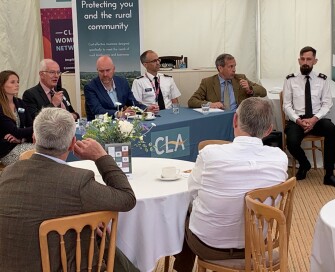PCC at the Royal Norfolk Show
The Royal Norfolk Show (29-30 June) proved to be a great place for Norfolk’s Police and Crime Commissioner, Giles Orpen-Smellie to meet people and organisations from across the county to find out what local issues matter to them here in Norfolk.
The Office of the Police and Crime Commissioner for Norfolk had a stand in the emergency services village and were joined by two organisations funded by the Police and Crime Commissioner (PCC). Norfolk & Suffolk Victim Care and NIDAS (Norfolk’s Integrated Domestic Abuse Services) were on hand to talk to visitors and explain their much-needed services they provide for vulnerable people.
On the second day of the show, Giles invited members of the rural community to a Q&A panel on rural crime. This was hosted by the CLA, the Country Land and Business Association, and was presented by David Powles, the editor of the Eastern Daily Press. Giles was joined by CLA East Regional Director, Cath Crowther, CLA Vice President Gavin Lane, Norfolk’s Chief Constable, Paul Sanford and PC Chris Shelley to take questions from the floor.
Speaking to Radio Norfolk before the Q&A session, Giles said: “Norfolk is a rural county and if you want to put that in number terms, 60% of Norfolk’s population live in rural areas. A lot of people are involved in rural employment, farming is the obvious one but you’ve got others involved in the heritage industry and in all the other different parts of the rural community and in some respects it’s not actually the crime it’s the perception and threat of crime.”
Issues discussed at the Q&A included hare coursing, the theft of GPS devices from farm vehicles, theft of fuel, sheep worrying and fly-tipping.
The big topic of the session was the illegal blood sport, hare coursing. The audience heard that a multi-partnership effort in the East had achieved a significant reduction in this criminal practice but work would continue to stamp out the ‘sport’ which involved organised criminal gambling syndicates.
Norfolk’s Chief Constable, Paul Sanford, explained that a number of initiatives were in place to thwart this type of criminal activity. Operation Moonshot uses ANPR (automatic number plate recognition) systems to tackle rural crime and transient criminals who enter the county to offend. Using ANPR had already helped with the seizure of assets. “That is one of the greatest deterrents you can give to someone involved in this crime. Take their car, take their dogs, take their driving licence, and then it stops,” he said.
CLA East Regional Director, Cath Crowther raised that some of her members felt that the reporting of rural crime was not seen as a priority, with police officers on one occasion taking over a week to visit a victim of crime.
Chief Constable, Paul Sanford and PC Shelley of Operation Randall urged farmers and landowners to report rural crime in order to build police intelligence of where crime was occurring.
Further discussion took place about the delays in the Criminal Justice System which were slowing down the pace of convictions.
CLA Vice President, Gavin Lane was keen to emphasise the impact of crime on victims and the frustrations of dealing with a “very urban-centric magistrates”. Mr Lane explained that: “If you get sentenced at Norwich, it can be people with very little experience of what hare coursing is like, so they think it is slap on the wrist and it’s all fine.”
While Giles praised the work of the (CPS) Crown Prosecution Service and court system, he echoed this lack of understanding from the viewpoint of the victim. “Often if you talk to magistrates about GPS theft, they think it’s a £100 thing you stick on your dashboard. They don’t understand it is a £10,000 high-precision piece mounted on a tractor.”
Giles’ recommendation to address this dilemma was for all rural partnerships to rally together to form “a loud voice because one PCC in a rural county gets lost in the noise [at Westminster].”
The Q&A panel proved so successful that plans are in place to repeat the format for next year’s show.
